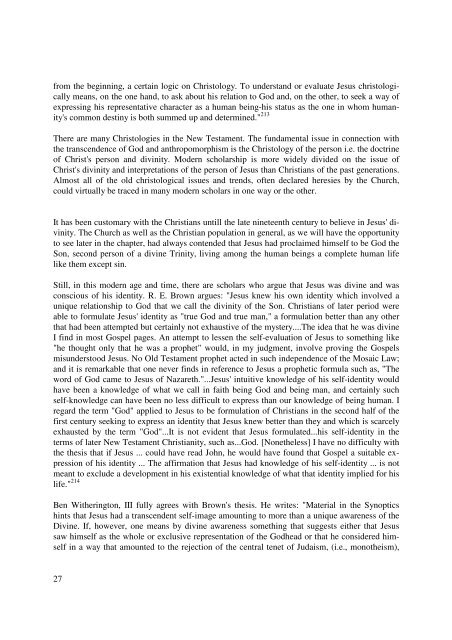Scripture and God in Christianity
Scripture and God in Christianity
Scripture and God in Christianity
You also want an ePaper? Increase the reach of your titles
YUMPU automatically turns print PDFs into web optimized ePapers that Google loves.
from the beg<strong>in</strong>n<strong>in</strong>g, a certa<strong>in</strong> logic on Christology. To underst<strong>and</strong> or evaluate Jesus christologically<br />
means, on the one h<strong>and</strong>, to ask about his relation to <strong>God</strong> <strong>and</strong>, on the other, to seek a way of<br />
express<strong>in</strong>g his representative character as a human be<strong>in</strong>g-his status as the one <strong>in</strong> whom humanity's<br />
common dest<strong>in</strong>y is both summed up <strong>and</strong> determ<strong>in</strong>ed." 213<br />
There are many Christologies <strong>in</strong> the New Testament. The fundamental issue <strong>in</strong> connection with<br />
the transcendence of <strong>God</strong> <strong>and</strong> anthropomorphism is the Christology of the person i.e. the doctr<strong>in</strong>e<br />
of Christ's person <strong>and</strong> div<strong>in</strong>ity. Modern scholarship is more widely divided on the issue of<br />
Christ's div<strong>in</strong>ity <strong>and</strong> <strong>in</strong>terpretations of the person of Jesus than Christians of the past generations.<br />
Almost all of the old christological issues <strong>and</strong> trends, often declared heresies by the Church,<br />
could virtually be traced <strong>in</strong> many modern scholars <strong>in</strong> one way or the other.<br />
It has been customary with the Christians untill the late n<strong>in</strong>eteenth century to believe <strong>in</strong> Jesus' div<strong>in</strong>ity.<br />
The Church as well as the Christian population <strong>in</strong> general, as we will have the opportunity<br />
to see later <strong>in</strong> the chapter, had always contended that Jesus had proclaimed himself to be <strong>God</strong> the<br />
Son, second person of a div<strong>in</strong>e Tr<strong>in</strong>ity, liv<strong>in</strong>g among the human be<strong>in</strong>gs a complete human life<br />
like them except s<strong>in</strong>.<br />
Still, <strong>in</strong> this modern age <strong>and</strong> time, there are scholars who argue that Jesus was div<strong>in</strong>e <strong>and</strong> was<br />
conscious of his identity. R. E. Brown argues: "Jesus knew his own identity which <strong>in</strong>volved a<br />
unique relationship to <strong>God</strong> that we call the div<strong>in</strong>ity of the Son. Christians of later period were<br />
able to formulate Jesus' identity as "true <strong>God</strong> <strong>and</strong> true man," a formulation better than any other<br />
that had been attempted but certa<strong>in</strong>ly not exhaustive of the mystery....The idea that he was div<strong>in</strong>e<br />
I f<strong>in</strong>d <strong>in</strong> most Gospel pages. An attempt to lessen the self-evaluation of Jesus to someth<strong>in</strong>g like<br />
"he thought only that he was a prophet" would, <strong>in</strong> my judgment, <strong>in</strong>volve prov<strong>in</strong>g the Gospels<br />
misunderstood Jesus. No Old Testament prophet acted <strong>in</strong> such <strong>in</strong>dependence of the Mosaic Law;<br />
<strong>and</strong> it is remarkable that one never f<strong>in</strong>ds <strong>in</strong> reference to Jesus a prophetic formula such as, "The<br />
word of <strong>God</strong> came to Jesus of Nazareth."...Jesus' <strong>in</strong>tuitive knowledge of his self-identity would<br />
have been a knowledge of what we call <strong>in</strong> faith be<strong>in</strong>g <strong>God</strong> <strong>and</strong> be<strong>in</strong>g man, <strong>and</strong> certa<strong>in</strong>ly such<br />
self-knowledge can have been no less difficult to express than our knowledge of be<strong>in</strong>g human. I<br />
regard the term "<strong>God</strong>" applied to Jesus to be formulation of Christians <strong>in</strong> the second half of the<br />
first century seek<strong>in</strong>g to express an identity that Jesus knew better than they <strong>and</strong> which is scarcely<br />
exhausted by the term "<strong>God</strong>"...It is not evident that Jesus formulated...his self-identity <strong>in</strong> the<br />
terms of later New Testament <strong>Christianity</strong>, such as...<strong>God</strong>. [Nonetheless] I have no difficulty with<br />
the thesis that if Jesus ... could have read John, he would have found that Gospel a suitable expression<br />
of his identity ... The affirmation that Jesus had knowledge of his self-identity ... is not<br />
meant to exclude a development <strong>in</strong> his existential knowledge of what that identity implied for his<br />
life." 214<br />
Ben Wither<strong>in</strong>gton, III fully agrees with Brown's thesis. He writes: "Material <strong>in</strong> the Synoptics<br />
h<strong>in</strong>ts that Jesus had a transcendent self-image amount<strong>in</strong>g to more than a unique awareness of the<br />
Div<strong>in</strong>e. If, however, one means by div<strong>in</strong>e awareness someth<strong>in</strong>g that suggests either that Jesus<br />
saw himself as the whole or exclusive representation of the <strong>God</strong>head or that he considered himself<br />
<strong>in</strong> a way that amounted to the rejection of the central tenet of Judaism, (i.e., monotheism),<br />
27
















